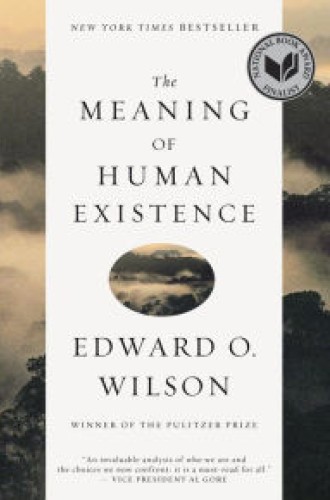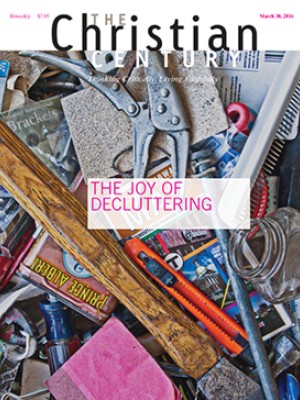Evolving into community
Although the renowned biologist Edward O. Wilson affirms in The Meaning of Human Existence that humanity is “completely alone” in the universe—there is no God, no heaven—he writes in a religious manner. Indeed, in a 2014 radio interview about the book, Wilson classified himself as a “provisional atheist,” leaving open the possibility that a supernatural power might exist.
In seeking existential meaning, the book involves the part of our psyche that is focused on religion, ritual, ethics, morals, immortality, and the yearning for the transcendent. Neuroscience suggests “strongly that a religious instinct does indeed exist,” Wilson himself observes.
Read our latest issue or browse back issues.
Twice a winner of the Pulitzer Prize in nonfiction and an entomologist who has identified over 400 species of ants, Wilson sums up the meaning of our existence as the “epic of the species, begun in biological evolution and prehistory, passed into recorded history, and urgently now, day by day, faster and faster into the indefinite future, it is also what we will choose to become.” Wilson doesn’t speculate on the origins of the universe. Instead, he compactly reviews the sweep of our species’ history in terms of evolutionary theory and the humanities. No matter what their background, readers who are people of faith will find here a brilliant summary of the scientific outlook on the world from one of our era’s leading scientific thinkers.
Wilson stresses the need to construct a bridge between the natural sciences and the humanities. In the end, he says, scientific advance will be the simple part of history. Soon everybody across the globe will have access to the same technologies and medical advances. However, the humanities will ultimately determine the character of our future society. Philosophers, historians, artists, and other practitioners of the humanities have described human activity brilliantly, but have stopped short of asking why all of this activity has occurred. To provide the key to our future, they must work in tandem with natural scientists to fully elucidate our history.
Without calling it such, Wilson proposes what professional historians have termed “big history,” which joins prehistory (a very long period covering biological evolution, hunter-gatherer societies, and the invention of agriculture) with conventional history (a very short period commencing with the invention of writing 5,300 years ago). In Wilson’s words, we will then have the “whole properly presented as the living world’s greatest epic.”
To achieve this, academia will need to overcome the hard-core “jig-saw puzzles of specialization” that have created intellectual fiefdoms. “The most successful scientist thinks like a poet—wide-ranging, sometimes fantastical—and works like a bookkeeper. . . . He is careful never to be accused of rhetoric or poetry,” Wilson writes. “The exact opposite is the case in poetry and the other creative arts. There metaphor is everything. . . . We are a very special species, perhaps the chosen species if you prefer, but the humanities by themselves cannot explain why this is the case.”
Theology and religious studies can certainly be included in the humanities. Indeed, many religiously minded writers, such as the Jesuit paleontologist and geologist Pierre Teilhard de Chardin, have delved into the implications of scientific discovery for religious belief.
Along these lines, The Meaning of Human Existence will attract those who reject the false dichotomy between religion and science and instead seek to synthesize them. Wilson seems at least to partially agree with that dichotomy, but his emphasis on the importance of the humanities puts him closer to the middle ground in the debate than hard-line scientific critics of religion such as fellow biologist Richard Dawkins.
Wilson’s portrayal of the velocity of change in the human species forecasts a radically different world in our lifetimes—a technologically advanced world that will desperately need humanities specialists to help us redefine humanness and guarantee our survival. “The advances of science and technology will bring us to the greatest moral dilemma since God stayed the hand of Abraham: how much to retrofit the human genotype,” Wilson warns. “Shall it be a lot, a little bit, or none at all? . . . We are about to abandon natural selection, the process that created us, in order to direct our own evolution by volitional selection—the process of redesigning our biology and human nature as we wish them to be.”
This transformation will begin with the “correction” of genetic diseases by inserting healthy genes into an embryo, Wilson points out. “Many people object to therapeutic abortions,” he observes, “but I doubt that many would object to gene substitution, which can be compared with the replacement of a defective heart valve or diseased kidney.” But the long-term implications are far more serious. “So—how about longer lives, enlarged memory, better vision, less aggressive behavior, superior athletic ability, pleasing body odor?” Wilson asks. “The shopping list is endless.” Another dilemma: improving our brains and bodies with technological implants, resulting in a “fundamental change in the human condition.”
Wilson casts his vote for “existential conservatism, the preservation of biological human nature as a sacred trust.” He asserts that we must “promote the humanities, that which makes us human, and not use science to mess with the wellspring of this, the absolute and unique potential of the human future.” Retrofitting the human brain and sensory system would ultimately prove “suicidal.”
Wilson discusses the tension between individualistic and communitarian behavior, the great paradox all humans experience, and explains the biological basis for altruism. Altruism became dominant because it did a better job than selfishness in preserving the species. Wilson frequently uses the behavior of ants to demonstrate the importance of cooperative action for survival. The meaning of our lives is that we all belong to a collective, evolutionary process in which we, like the ants, work together to build our community and preserve the species.
Today the human species is ever more interconnected, and the greatest threat to our species is the “collapse of biodiversity,” Wilson declares. He thus walks with Christian and other religious people who consider defending creation to be one of the greatest moral imperatives of our time. Without biodiversity we could face extinction because of something as basic as the disappearance of fungi that provide our antibiotics. We depend on other species, many of which have yet to be discovered.
“We alone have measured the quality of mercy among our own kind,” Wilson concludes. “Might we now extend the same concern to the living world that gave us birth?”







